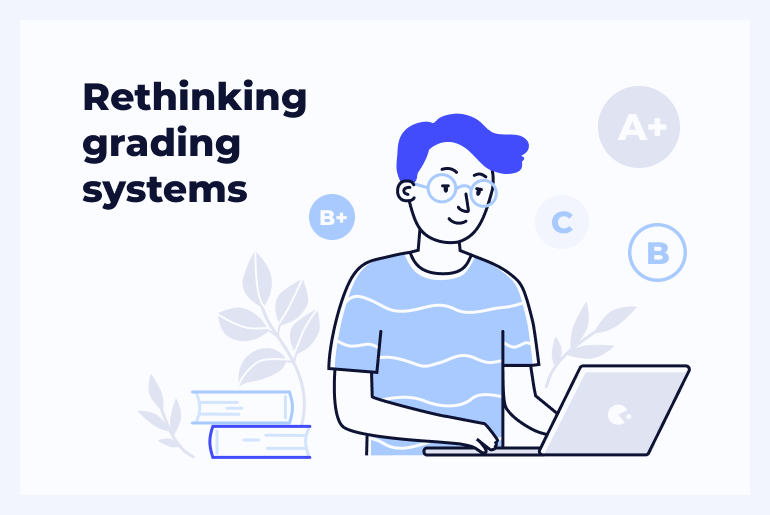Contract cheating is on the rise. Essay mills conduct aggressive marketing campaigns with shady messaging that implies giving you a break from writing essays, helping to write a “plagiarism-free” paper, reducing academic pressure.
They’re not only online but also right on campuses. Their major target group is vulnerable and desperate students who’ve already invested thousands of dollars in education and see no other options but to keep up at any cost, even through cheating.
According to the BBC, one in seven students has paid to get their work done for them.
“We know how hard it can be to fit everything in: studying, working, and socializing. It can get especially tough when you factor in tight deadlines and tons of research. In short, being a student is tough – and we know that!”
Academized.com
How is contract cheating harmful?
Let’s say that a student decides to “buy” his or her degree with the help of essay mill services. This seemingly good way to free up time for a side job or socialize during study usually leads to later regrets. Why? Soon after graduation, the student finds themselves lacking basic skills for their profession, and their employers figure this out very shortly.
Academic institutions are gradually losing reputation as more and more businesses dismiss their diplomas because they’re delivering a non-qualified workforce into the market. And rightfully so. The education process focuses on formal grading instead of honing students’ skills, which distorts the real picture and represents instead how inventive students can get.
The bigger problem behind academic dishonesty
Since there’s never smoke without a fire, contract cheating emerged as a symptom of a flawed system. The situation is this:
Higher education has become a big business, forcing students to commit to huge investments that most of them will be paying back for years to come. In pursuit of bright career prospects, students end up trapped in the belief that the stakes are too high to lose. And they are. Formal education, with its overpriced degree programs and bloated student loans, has shaped this attitude towards education as a business deal.
“As someone who has published in the area of plagiarism, my own view about the alarming rise in these services is that such services ride on the increasing cynicism of the value of education. As the cost of education rises and rises, people begin to think of it as a game, a necessary evil that must be won at all costs.”
User gasgiant from chronicle.com
Therefore, students don’t see the point of “wasting” time in the classroom when their focus is on repaying their loans and maintaining a social life. On top of that, teachers are so overburdened with all their responsibilities outside of teaching itself that they hardly find time for getting to know their students well enough to spot discrepancies in their writing.
This is exactly where essay mills step in with promotions based on this gaping hole in the system. And as long as they claim that they’re selling guides for student essays, which they do, none of petitions or laws can ban them because one can’t prohibit private tutoring or education charity services.
We’ve got the solution – Emma
The world of academia is not perfect. There are multiple pitfalls to overcoming existing issues. But we are here still to help educational institutions thrive and ensure that students are highly educated.
This is why Emma, Unicheck’s authorship verification technology, was created.
How it works
Emma recognizes a student’s unique writing styles based on machine-learning algorithms. To get started, you need to upload a minimum of 3 works (300 to 1000 words). It’s crucial to make sure all three documents are original.
Emma is not a tool that you’ll need to spend time setting up and learning. It runs automatically in your LMS along with Unicheck’s plagiarism detection functionality. Authorship advice is available on a separate tab, which provides a comprehensive conclusion on text ownership.
Emma, along with all Unicheck products, aims at serving both educators and students. Therefore, on top of authorship verification, Emma will soon receive NLP text analytics for students. This feature will provide clues regarding vocabulary, spelling, and overall language skills to help learners improve the academic significance of the paper.
[su_image_carousel source=”media: 29114,29115″ limit=”8″ crop=”none” align=”center” autoplay=”3″]
We designed Emma in response to the ever-evolving challenges of the educational landscape. Today, we need to ensure that students see education as a way to grow their professional capacities.
Emma was not created to punish, but to rather help instructors detect blind spots in the educational process and initiate meaningful conversations with those students who resort to cheating. The students, in turn, are receiving a chance to achieve quality education so that they can join the ranks of the highly competent workforce.
Content Creator at Unicheck
Interested in all things EdTech, Kate digs deep into the dilemmas of contemporary education to deliver a comprehensive picture of how the worlds of tech and academia intersect.





